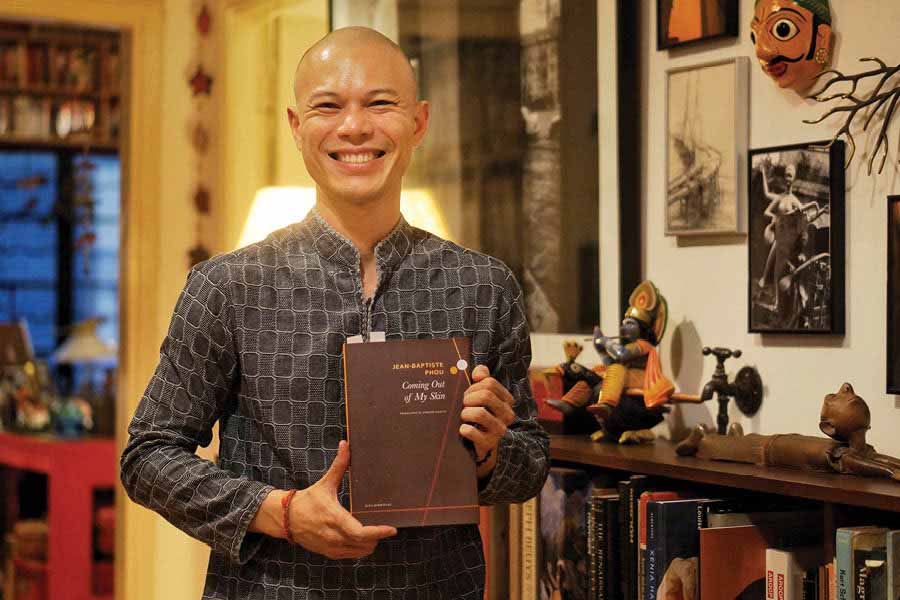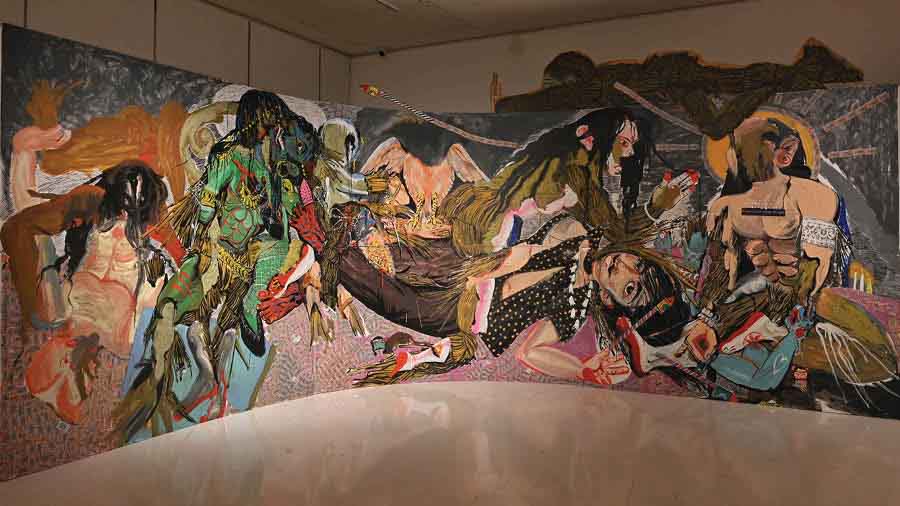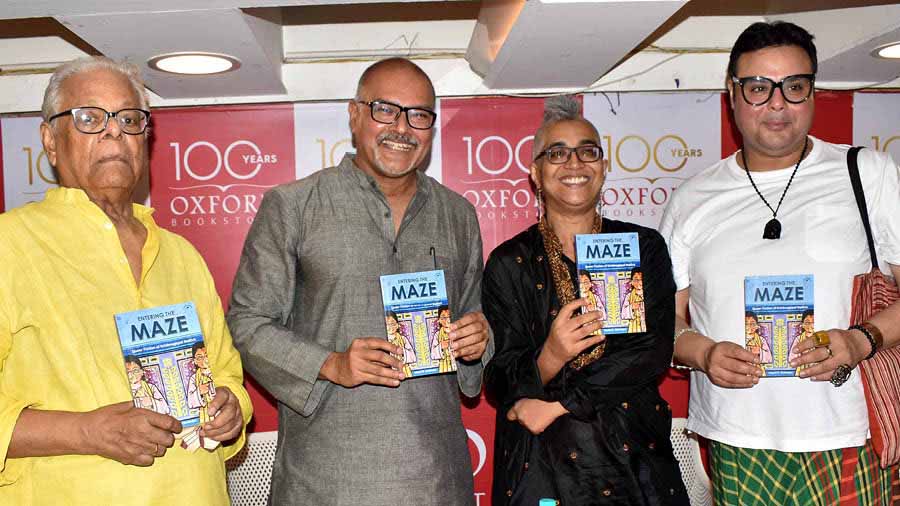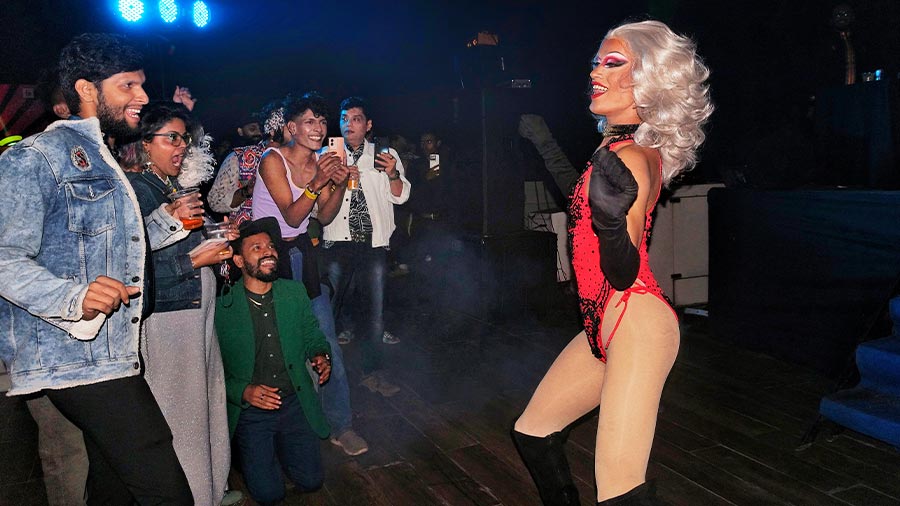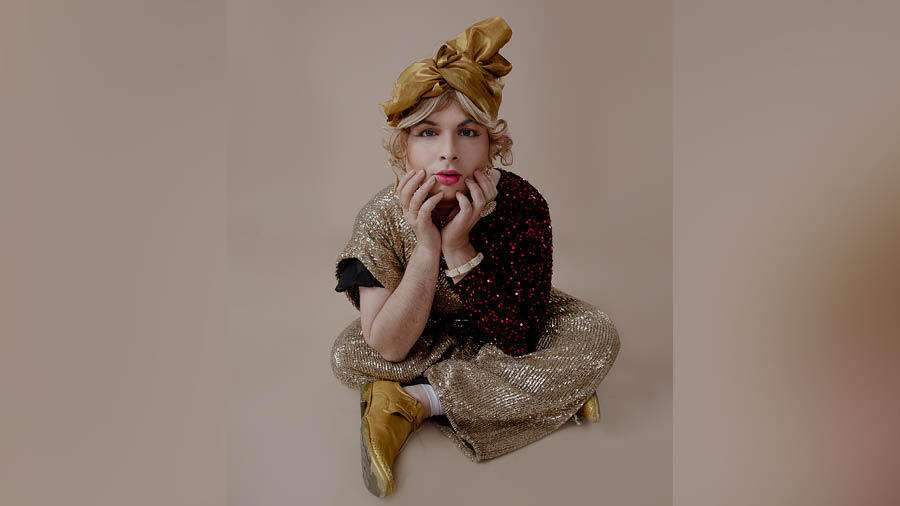“Papa, Mamma, I have something to tell you… I like boys.”
Author Jean-Baptiste Phou’s book, Coming Out of My Skin, is not just a memoir. It documents the journey of a mixed race gay man living in a predominantly White society, and his experiences in the intersectional context of race and sexuality. Reading the 42-year-old French-Cambodian author’s book leaves a lasting impact.
My Kolkata met Phou during his recent trip to India, at Seagull Books in Kolkata for the launch of his book. In conversation with Bishan Samaddar, editor at Seagull Books about Coming Out of My Skin, he spoke about his experiences as a gay Asian man living in Paris and in Phnom Penh, his take on LGBTQIA+ literature and more. The event was in association with Kolkata Pride.
“It was about my experience as an Asian gay male growing up in France”, shared Phou, while in conversation with Samaddar, unravelling the foundation that later turned into Coming Out of My Skin.
Born and raised in Paris, Phou discovered and explored his sexual identity in Europe. He also understood his ethnic identity in the city. And finding his identity is the central theme of his memoir. Apart from being an author, he is a playwright and an actor, a stage director, a sound artist, and artist and a former banker.
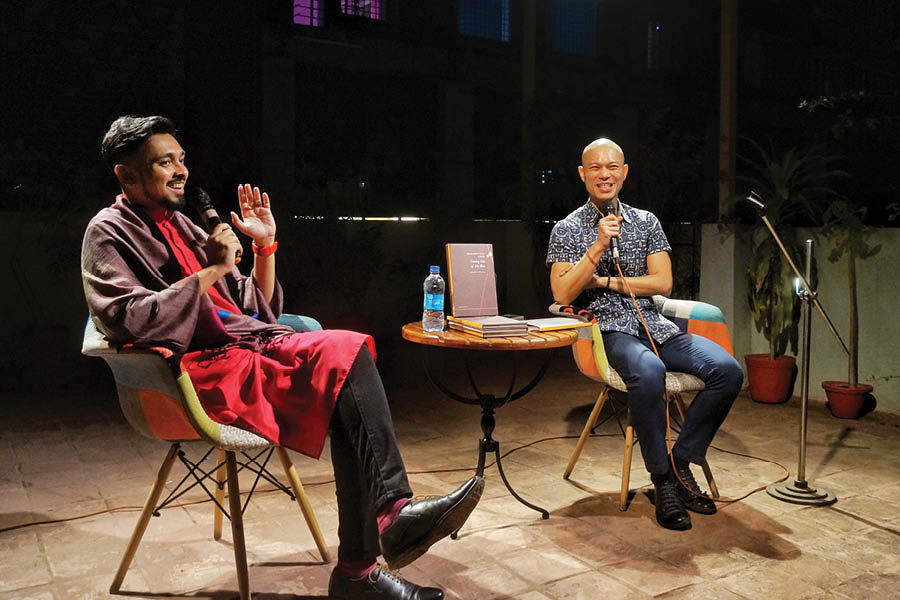
Seagull editor Bishan Samaddar in conversation with Jean-Baptiste Phou during the official launch of ‘Coming Out of My Skin’
‘Coming Out of My Skin’ is not just a memoir
“Are you gay?...Yes I am happy!...So you are gay…Don’t say that”.
These are some of the lines from Coming Out of My Skin that are sure to hit you hard. For Phou, ‘gay’ meant happy before he understood the other meaning of the word — one that became an intrinsic part of his identity. When he was 10, his mother told him he had to get married to a Chinese girl. This was the first excerpt he shared with his audience at the book reading at Seagull Books, bringing to light an age-old and prevalent social construct.
During the era when the internet was becoming part of our everyday lives, Phou was about 15 or 16 and he met someone. The meeting took an undesired turn, and someone threatened him about telling his secret to his parents. This was the catalyst to the author coming out to his parents. “I did not want someone else to tell them,” he said. The journey of his parents coming to terms with his identity was a long one. “It was not in a vocal or formal way. It was more subtle, with signs and gestures,” shared Phou.
Coming Out of My Skin goes beyond his experience of being out about his queer identity. It deals with the nuances of his everyday life encompassing different facets of his identity, including the colour of his skin, and going beyond it all to be seen simply as an individual. “The book talks about this journey, how this part of myself — my race or my ethnic background — played a role in my romantic relationships. It’s also about the strategies I developed in order to have a romantic life, reclaiming my sense of pride and confidence, navigating through the system,” shared Phou, when talking about the name of his book.
Who am I when no one is watching
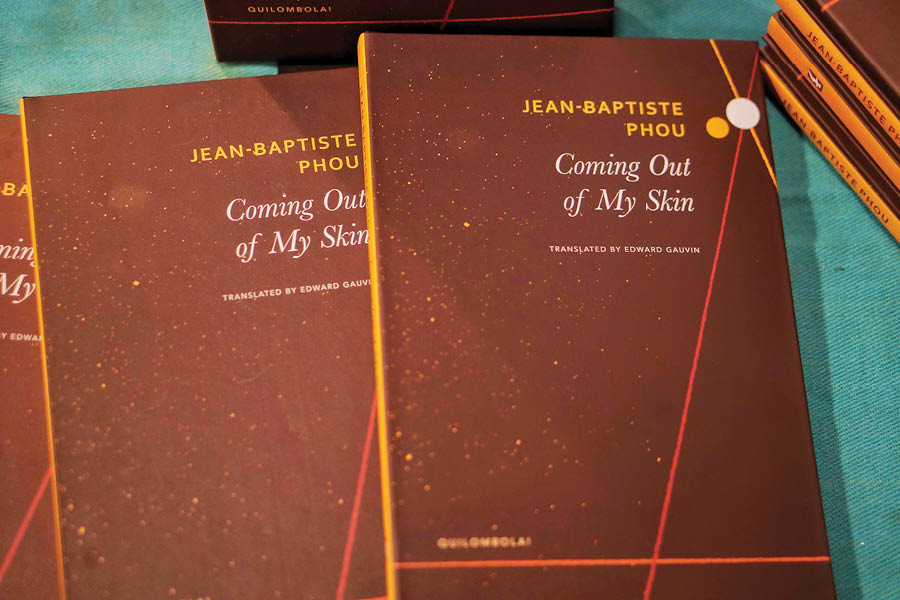
Jean-Baptiste Phou’s book, ‘Coming Out of my Skin’
Phou’s book began long before the words were written. “I wanted to explore something new and I made a podcast called The Colour of Desire. To me, sound is about letting the audience make their own movie in their imagination,” said the sound artist. It is with the podcast that the idea of Coming Out of My Skin first took shape.
“This is the first time I talk about my sexuality publicly. I have been an artist for 15-years now, and none of my work has been around sexuality or queerness. It has mainly been about being an Asian in France or the Cambodian diaspora experience” said Phou when asked if his gender identity plays a role in his expression of art. Overcoming fear of public perception or reluctance and not allowing them to “take over my expression,” are also things that led to writing the book.
A quest to find roots, no strings attached
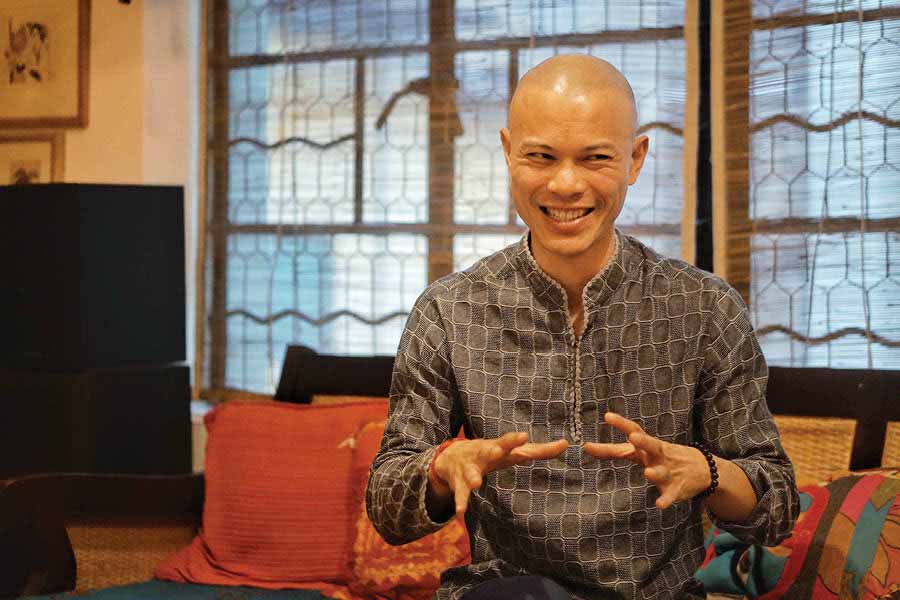
Phou in a jovial mood, discussing art and music, on a wintry evening in Kolkata
Phou currently lives in Phnom Penh. He moved to Cambodia, his family’s native land, in 2017 when he was 36. His parents, who immigrated from Cambodia to France in the 1970s relocated to Cambodia before he did, in the ’90s. Going back was “more like a cultural shock” for the young artist. People saw him as a foreigner. While Phou discovered the socio-politico history of Cambodia, the people tried to understand him.
The voice of a minority
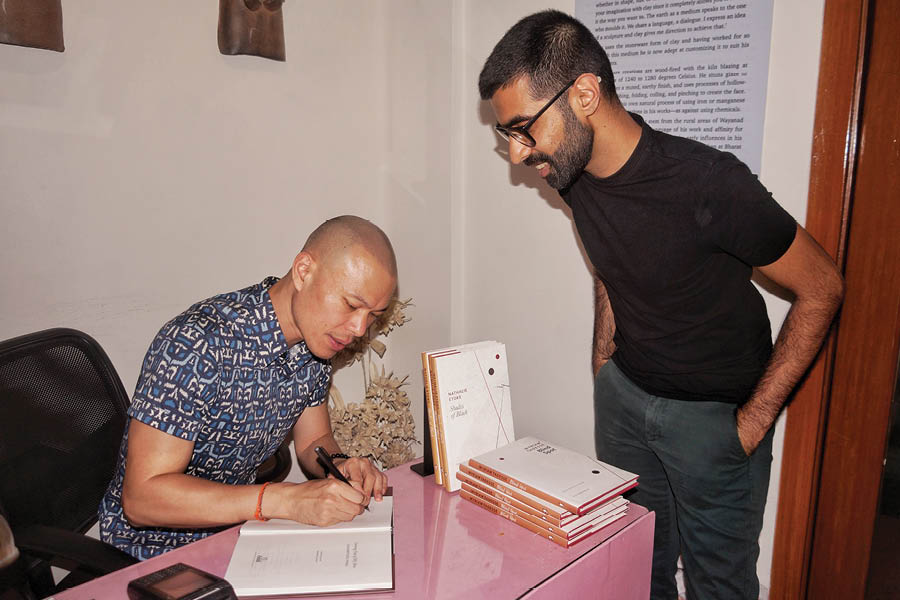
Phou signing his book at Seagull Books, Kolkata
“Growing up in France was like going against systemic racism. When I started to get into the gay scene or the dating scene, there was this constant thing about no Asians,” shared Phou. Stereotypes about physical attributes and other biases associated with east Asians and southeast Asians was something Phou kept coming across for years when living in Paris.
For a long time in France, the most challenging thing has been being “put in a box.” Speaking about perceptions, Phou said, “In Europe, I am always perceived as Asian. That’s what people see first,” unlike in Cambodia because of the commonality in ethnicity. He is headed back to France after his India tour, to turn his book into a stage adaptation. He is also promoting his other book, 80 Words from Cambodia.
The power of Pride, the power of literature
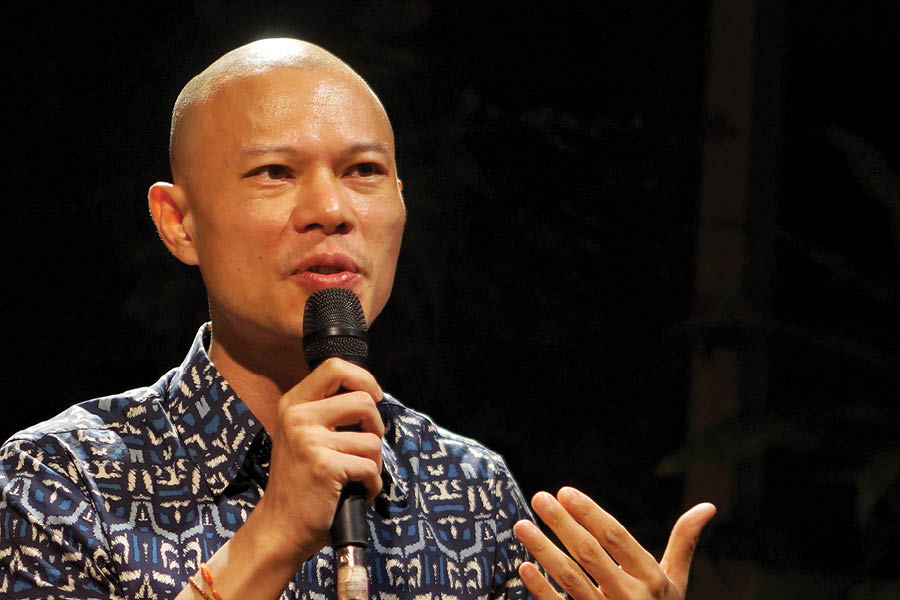
Phou at the book-reading session
“I think it is important to hear these [queer] voices, and literature is a big part of that”, shared Phou. While growing up, he had no reference point, or anyone around him, to talk about what he was experiencing. Being an author himself and with his memoir, he has tried to document a journey that could help anyone trying to find oneself. “I felt extremely lonely and isolated. Hence books and Pride festivals are important so you know you are not alone.” LGBTQIA+ literature alleviates this feeling of being alone for many, creating a sense of solidarity is the power of it, opined the author.
“There is no right way to do it, and there is definitely no path to follow. Because, at least in France where I grew up, we always saw coming out as a thing to do. Everybody’s context is different,” he said, stressing that environment, economical background, culture, and family play a role in the decision to come out.
Dialogues with Kolkata
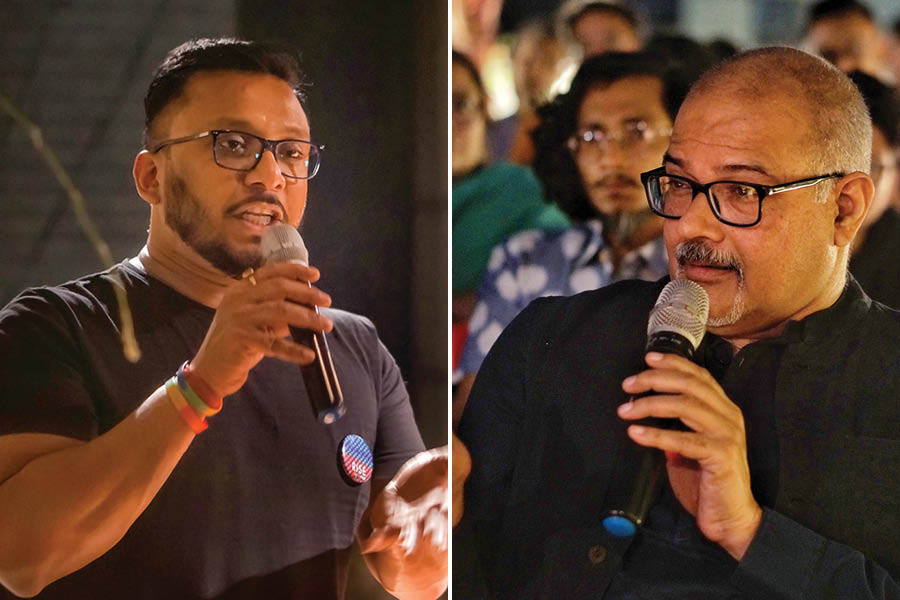
(L to R) Fashion designer Nil and academician Niladri R. Chatterjee at the event
Phou’s dialogues with Kolkatans, who dropped by at Seagull Books for the event, touched on subjects like the class and power, the role of class desires and more. He also spoke about the laws and legislations regarding homosexuality in Cambodia with professor Niladri R. Chatterjee.
Fashion designer, and one of the most prominent faces of Kolkata Pride, Nil, spoke about Phou’s story resonating with him. Thanking Naveen Kishore and Samaddar, he reflected on the necessity of slowing down to read, while sharing the journey of the month-long and now five-year-old Kolkata Pride, which grew from Kolkata Rainbow Pride Walk, the oldest in Asia.
You can buy the Seagull Books published Coming Out of My Skin here.
-
Niladri R. Chatterjee sheds light on a ‘Queer Bengali’ in his book ‘Entering the Maze’

-
I am a trans man and I am a musician. I am not a trans artist: Jay Anand

-
In pictures: Queer performers slay at the Ultimate Drag Christmas Eve fundraiser

-
Meet Patruni Sastry, the dancer who brought drag to Hyderabad

